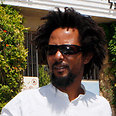
Danny Adino Ababa
צילום: עטא עוויסאת
Israeli racism scares me
Op-ed: Ethiopian-born journalist fears his three children will always feel foreign in racist Israel
Newspaper headlines referring to displays of racism against members of Israel's Ethiopian community are just headlines. Yet for me and for members of my community this wound gets deeper and refuses to heal. After every racist display, the public expresses its revulsion, yet we, members of the Ethiopian community, are left with the pain and without answers.
I was born in Ethiopia and have three young children. My wife is a nurse at a large hospital. I am a journalist at a leading newspaper. Our children are educated in private kindergartens. On the face of it, we are "successful immigrants."
My three children were born here, yet ever since they were born, for the first time in my life I've been facing an uncontrollable fear. I'm anxious about their future. I assume that many of you live in some kind of fear in respect to your children's future, yet you are worried for different reasons.
I want to tell you about my fear. It does not stem from the Iranian bomb or the war that is expected to erupt in our mad region. I'm afraid because of my children's dissimilarity, due to the color of their skin. I'm fearful that they won't be accepted to schools or to extracurricular activities just because they're different. I'm fearful because once upon a time people felt ashamed to be racist, yet today Israeli racists rear their head and speak up openly.
My oldest son, who will soon celebrate his fourth birthday, already encountered this racism. One day my wife and I came to pick him up from preschool, when another child appeared and said "what a disgusting black kid." My son withdrew into himself as my wife tried to cheer him up in vain. In the car, he burst into tears, and my wife followed. "I'm crying over my son's helplessness," she said.
After wiping away her tears, she asked that we return to the kindergarten so she can speak to the insulting child. She faced him and her tears kept on falling. The next morning we received a letter of apology from his parents.
Dark chocolate
Ever since then, every day I gently ask my son whether anyone called him "black" or insulted him because of his ethnicity. Usually he is silent, yet occasionally he shows interest in the color of his skin. One day he surprised me: "Dad, black is darkness, it's not a pretty color and I don't like it," he said.
I tried to explain to him how beautiful our skin color is. I came up with every superlative I could think of. After failing, I suddenly remembered that my son loves chocolate more than anything else. "You see," I told him, "chocolate is delicious. And what color is it?" I don't know if my son accepted the comparison between chocolate and his skin color, yet he certainly ate the chocolate I gave him and asked for more. To this day I haven't told him that there's such thing as white chocolate too.
I will never fully feel that I belong in this country; I will always feel like a foreigner in a crowd. At the same time, I always knew subconsciously that once I have children, they will feel like members of this land and my foreignness will never cling to them. Yet in the past year I find myself often thinking about the foreignness of the "black sabra," as every one of my sons can be referred to.
The latest displays of racism scare me, if only because of the silence of the lambs by the silent majority. I'm scared because I feel that everyone sees us sinking and keeps silent. I'm afraid that my eldest son will inherit the foreignness within me.
The next time you see racist displays on your television screen, think about me, about my Israeli-born son, and about my thoughts and deep pain. What you perceive as yet another newspaper article and another ephemeral story is a painful, sad and never-ending journey for us.










